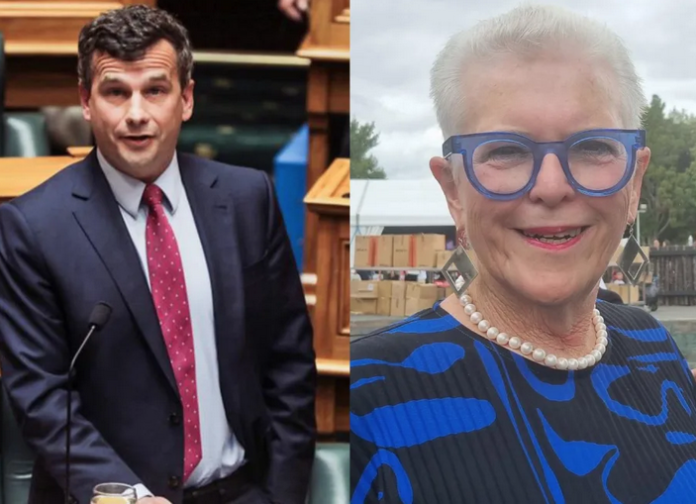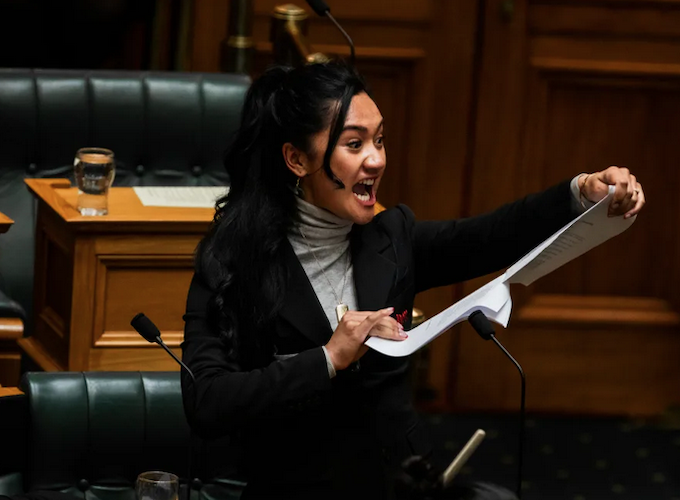
A former New Zealand prime minister, Dame Jenny Shipley, has warned the ACT Party is “inviting civil war” with its attempt to define the principles of the 1840 Te Tiriti o Waitangi in law.
The party’s controversial Treaty Principles Bill passed its first reading in Parliament on Thursday, voted for by ruling coalition members ACT, New Zealand First and National.
National has said its MPs will vote against it at the second reading, after only backing it through the first as part of the coalition agreement with ACT.
- READ MORE: NZ’s Treaty Principles Bill haka highlights tensions between Māori tikanga and rules of Parliament
- NZ’s Treaty Principles Bill is already straining social cohesion – a referendum could be worse
- NZ’s Hīkoi challenging controversial draft bill ‘redefines activism’, says Herald
- Labour’s Willie Jackson ejected from House for calling David Seymour a liar during Treaty Principles Bill reading
- NZ’s Treaty Principles Bill passes first reading after Māori MP evicted over haka
- Other Hīkoi reports
Voting on the bill was interrupted when Te Pāti Māori’s Hauraki Waikato MP Hana-Rāwhiti Maipi-Clarke tore up a copy of the bill and launched into a haka, inspiring other opposition MPs and members of the public gallery to join in.
Dame Jenny, who led the National Party from 1997 until 2001 and was prime minister for two of those years, threw her support behind Maipi-Clarke.
“The Treaty, when it’s come under pressure from either side, our voices have been raised,” she told RNZ’s Saturday Morning.
“I was young enough to remember Bastion Point, and look, the Treaty has helped us navigate. When people have had to raise their voice, it’s brought us back to what it’s been — an enduring relationship where people then try to find their way forward.
“And I thought the voices of this week were completely and utterly appropriate, and whether they breach standing orders, I’ll put that aside.
“The voice of Māori, that reminds us that this was an agreement, a contract — and you do not rip up a contract and then just say, ‘Well, I’m happy to rewrite it on my terms, but you don’t count.’

“I would raise my voice. I’m proud that the National Party has said they will not be supporting this, because you cannot speak out of both sides of your mouth.
“And I think any voice that’s raised, and there are many people — pākeha and Māori who are not necessarily on this hikoi — who believe that a relationship is something you keep working at. You don’t just throw it in the bin and then try and rewrite it as it suits you.”
Her comments come after Prime Minister Christopher Luxon called the bill “simplistic” and “unhelpful”, and former Treaty Negotiations Minister Chris Finlayson — who negotiated more settlements than any other — said letting it pass its first reading would do “great damage” to National’s relationship with Māori.
The Treaty Principles Bill reading vote. Video: RNZ News
Dame Jenny said past attempts to codify Treaty principles in law had failed.
“While there have been principles leaked into individual statutes, we have never attempted to — in a formal sense — put principles in or over top of the Treaty as a collective. And I caution New Zealand — the minute you put the Treaty into a political framework in its totality, you are inviting civil war.
“I would fight against it. Māori have every reason to fight against it.
“This is a relationship we committed to where we would try and find a way to govern forward. We would respect each other’s land and interests rights, and we would try and be citizens together — and actually, we are making outstanding progress, and this sort of malicious, politically motivated, fundraising-motivated attempt to politicise the Treaty in a new way should raise people’s voices, because it is not in New Zealand’s immediate interest.
“And you people should be careful what they wish for. If people polarise, we will finish up in a dangerous position. The Treaty is a gift to us to invite us to work together. And look, we’ve been highly successful in doing that, despite the odd ruction on the way.”
She said New Zealand could be proud of the redress it had made to Māori, “where we accepted we had just made a terrible mess on stolen land and misused the undertakings of the Treaty, and we as a people have tried to put that right”.
“I just despise people who want to use a treasure — which is what the Treaty is to me — and use it as a political tool that drives people to the left or the right, as opposed to inform us from our history and let it deliver a future that is actually who we are as New Zealanders . . . I condemn David Seymour for his using this, asking the public for money to fuel a campaign that I think really is going to divide New Zealand in a way that I haven’t lived through in my adult life. There’s been flashpoints, but I view this incredibly seriously.”
‘Equal enjoyment of the same fundamental human rights’
In response, David Seymour said the bill actually sought to “solve” the problem of “treating New Zealanders based on their ethnicity”.
“Te Pāti Māori acted in complete disregard for the democratic system of which they are a part during the first reading of the bill, causing disruption, and leading to suspension of the House.
“The Treaty Principles Bill commits to protecting the rights of everyone, including Māori, and upholding Treaty settlements. It commits to give equal enjoyment of the same fundamental human rights to every single New Zealander.
“The challenge for people who oppose this bill is to explain why they are so opposed to those basic principles.”
On Thursday, following the passing of the bill’s first reading, he said he was looking forward to seeing what New Zealanders had to say about it during the six-month select committee process.
“The select committee process will finally democratise the debate over the Treaty which has until this point been dominated by a small number of judges, senior public servants, academics, and politicians.
“Parliament introduced the concept of the Treaty principles into law in 1975 but did not define them. As a result, the courts and the Waitangi Tribunal have been able to develop principles that have been used to justify actions that are contrary to the principle of equal rights. Those actions include co-governance in the delivery of public services, ethnic quotas in public institutions, and consultation based on background.
“The principles of the Treaty are not going away. Either Parliament can define them, or the courts will continue to meddle in this area of critical political and constitutional importance.
“The purpose of the Treaty Principles Bill is for Parliament to define the principles of the Treaty, provide certainty and clarity, and promote a national conversation about their place in our constitutional arrangements.”
He said the bill in no way would alter or amend the Treaty itself.
“I believe all New Zealanders deserve tino rangatiratanga — the right to self-determination. That all human beings are alike in dignity. The Treaty Principles Bill would give all New Zealanders equality before the law, so that we can go forward as one people with one set of rights.”
The Hīkoi today was in Hastings, on its way to Wellington, where it is expected to arrive on Monday.
This article is republished under a community partnership agreement with RNZ.












































